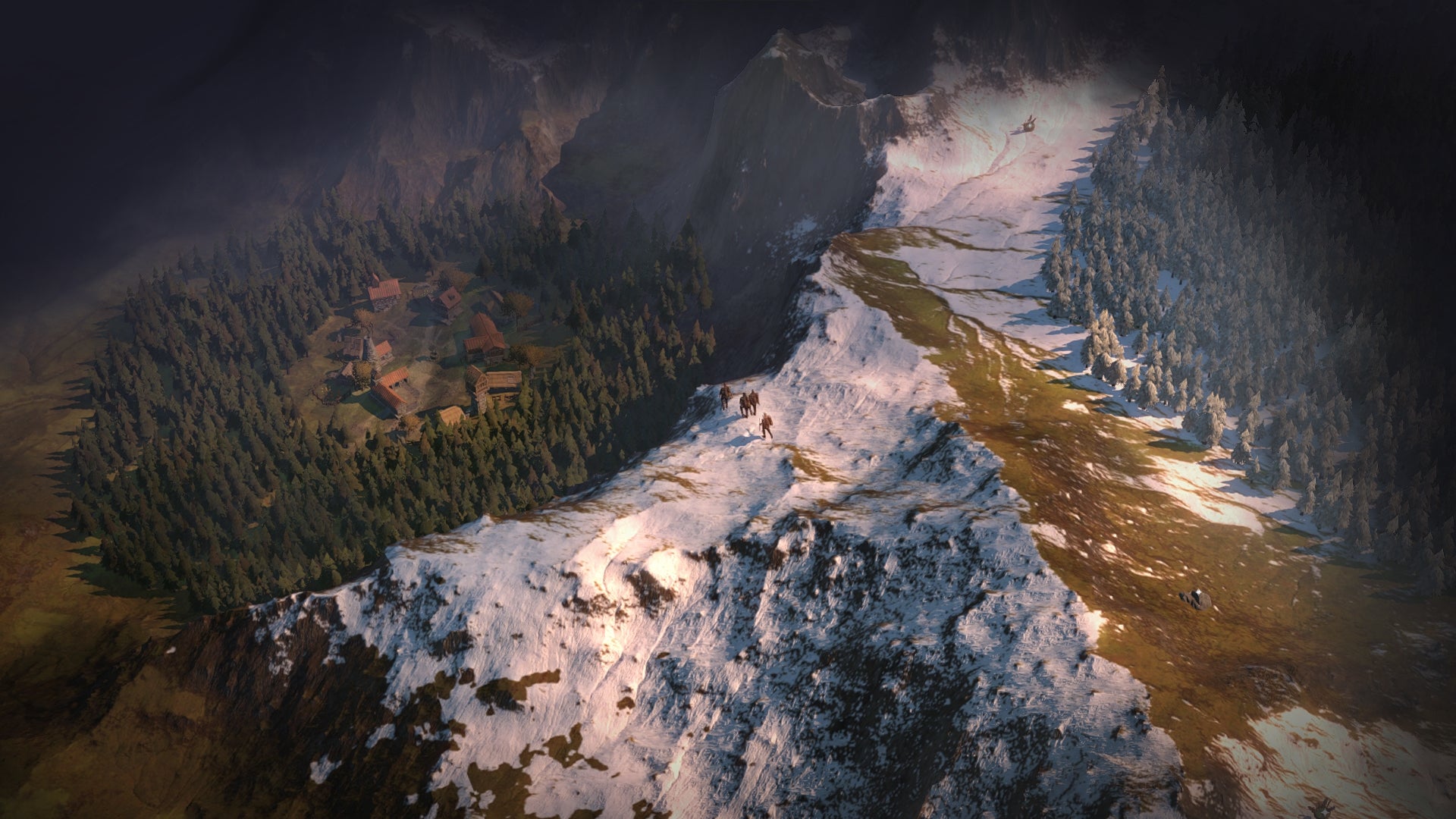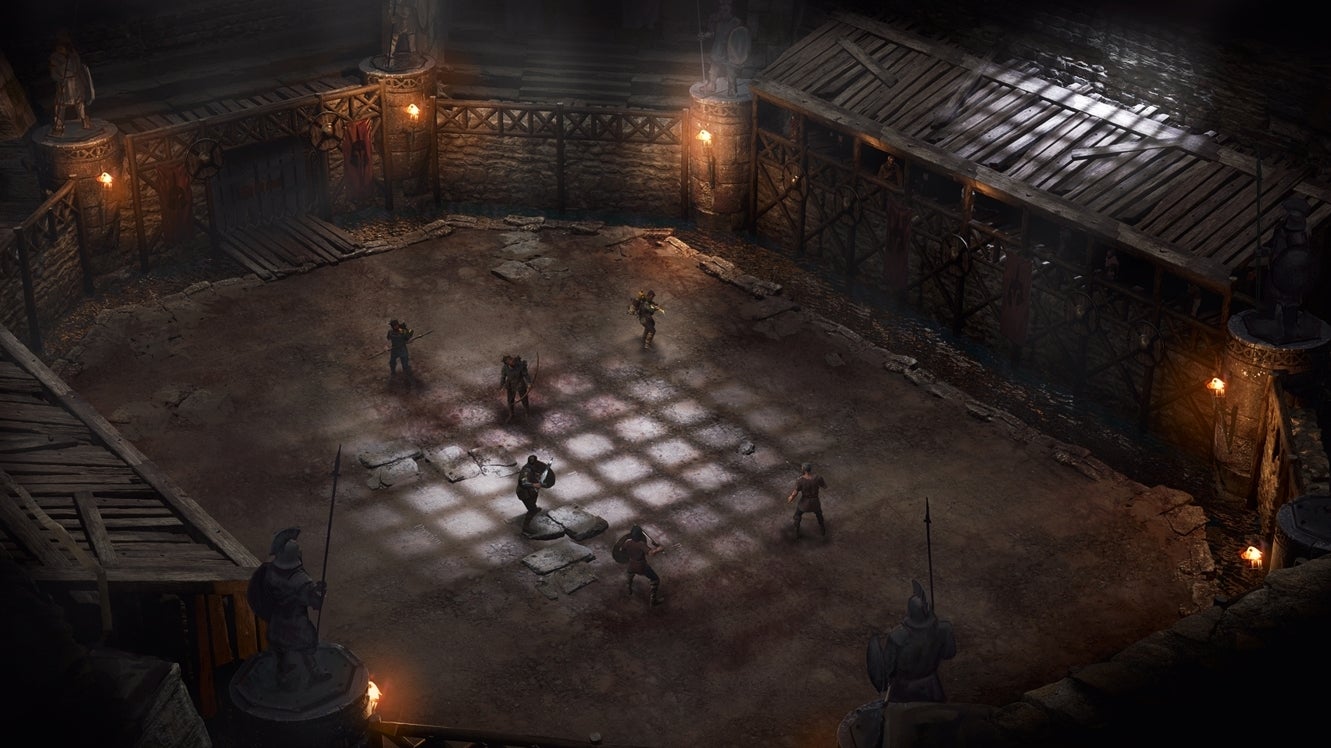
[ad_1]
You can always beat the wolves, right? They’re usually the next rung up from rats; even at their very hardest, they’re maybe the fourth distinct creature thing a trainee adventurer has to slash into giblets on their way to bigger and better things. These grey, hairy training wheels might do a bit of snarling, a few mild biteroonies, but they won’t ever kill you. That’s not what wolves do.
Wartales, the next game from Northgard devs Shiro Games and which lands in early access this week, didn’t get the memo. Just twenty minutes into this sombre, map-wandering mercenary adventure, I ran into a crew of the old growly-howlies, and got killed to pieces. My second run, at least, left me with one survivor. But they were soon ruined financially by the burden of treating their wounds and repairing their mangled armour, and eventually met their end in a muddy ditch, at the end of a bandit’s longsword. This game, folks, is not messing about.
I love low fantasy. That is to say, fantasy with little or nothing in the way of magic, elves, or even prophecies. Low fantasy, to me, offers all the grim delights of medieval history, without being weighed down by any need to reflect the actual events of the past. It’s a subgenre that lends itself particularly well to stories of murky people doing murky things, and people don’t get much murkier than mercenaries.
Enter Wartales, then, which maddens me with the urge to append “woo-hoo” to its name every time I type it. It’s a game about getting by in a medievalish world reeling from the effects of a calamitous plague -and when I say “getting by”, that’s exactly what I mean. “Your job is just to survive and to do the best you can,” explains creative director Nicolas Cannasse, as he joins me for my third attempt to break the Wolf Barrier, “based on whatever moral stance you choose to go in with.”
While Cannasse says your adventurers can become tangentially involved in the setting’s deeper goings-on, they are never going to be savers of worlds, or history-defining heroes. They’re just people looking to make a living in a shitty economy.
In practice, this will usually mean taking up work as a band of mercenaries doing stabbings for cash, although it’s equally valid to build a life as a merchant hauling goods between towns, or just a bunch of backwoods shitbags ambushing honest passers-by. It feels like a game about being an NPC, and I love that about it. “It’s the feeling you get playing Skyrim,” says Cannasse, trying to define the mood Shiro Games have aimed for, “when you realise it’s more fun if you don’t play the main quests”.
The actual action of the game breaks down into two main slices, the first of which comprises moving your party around the world. The world is massive, by the way – the section explorable in the demo felt big enough to be a world map in itself, to be honest, but is apparently only one small section of a much, much larger picture. It’s pretty, too: barren and bleak in places, but with enough green to avoid feeling drab and dull, and sculpted into some surprisingly believable landscapes. It genuinely made me feel compelled to go out and explore, which is a feeling few game worlds prompt for me.

Your ramblings on this map can lead to a number of smaller subactivities – going into towns to trade with merchants or hire new brutes, for example, or investigating wooded camps for loot. You can also camp at any point, entering a camp screen where you can assign your various hires to tasks such as armour repair, resting, or potion brewing, depending on their skills. There’s a simple management element to this which reminded me of the campfire sections in Darkest Dungeon, complete with the perilously rapid depletion of food stocks. There’s also an added stressor in that your party members require regular pay, acquired either from trade or from earning bounties from towns, and will simply walk out on you if you can’t keep them coined up.

The second big slice of the game’s content, and the most frequent reason for leaving the map, is combat. Fights are turn-based, of the flavour where your individual fighters and their enemies take it in turns to move, but you get to choose what order your folks act in, within each round of the sequence. The field of battle is grid-based, but as the grid squares are much smaller than characters’ footprints, the result feels more along the freeform lines of Divinity or Baldur’s Gate than the relative rigidity of Banner Saga.
The combat system is fairly simple, and makes a big point of not relying on random number generators to determine the strength of hits. There is some amount of chance involved, particularly when using ranged weapons, but margins of variance are slim, so you tend to know what you can expect. In my case, usually, that seems to be death by wolf.
With that said, Cannasse did manage to coach me through my third wolfing with the calm wisdom of a more articulate Yoda, and all of my bruisers made it out just about intact. It was a close thing, still – but interestingly, this wasn’t entirely due to the difficulty of Wartales’ combat system.

“I think it was the second horse, perhaps,” my mentor suggests tactfully, as my mercs lick their wounds in camp after the fight. He is right, of course. Revelling in the – very genuine – sense of freedom upon starting the game, I had, in all three of my runs to date, pooled all of my initial resources to buy a second horse. I hadn’t had an aim in mind for this extra hoofo, of course. I’d just decided it would be cool.
And, to its credit, Wartales had let me do it. It just went on to pull absolutely no punches in teaching me what happens to idiots who spaff all their money on horses rather than recruits, supplies and medicine. They get beasted by wolves. Fair play, Wartales.
[ad_2]





